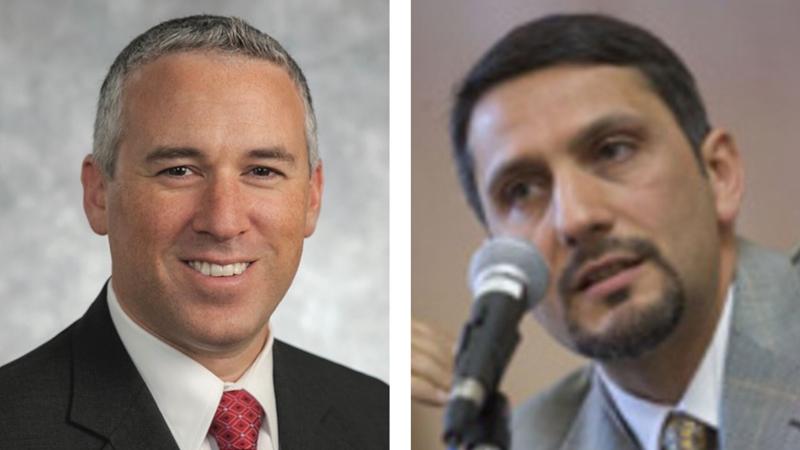University campuses are in chaos, not protest movements, and three organizations shut down two decades ago by federal authorities are tied to the action, says a respected author and researcher.
Jonathan Schanzer, appearing Monday as The Heritage Foundation hosted Never Again Is Not Enough, explained his opinion on the connection between the rise in activism across campuses and previous organizations with ties to Hamas. The discussion on antisemitism in America was on the anniversary of Israel being attacked by Hamas rebels.
The Middle East war persists, with Americans among the hostages.
Heritage, a conservative-leaning policy organization in Washington, hosted the two-part panel discussion on attempts to criminalize Israel’s war efforts and the unprecedented rise of antisemitism on the streets and campuses of American universities. The attack happened Oct. 7, 2023, at the Nova music festival, with Hamas breaking through the border fence of Gaza in 60 different locations and killing more than 1,000 Israelis.
At least 251 people were kidnapped and brought into Gaza. Women were brutally raped, others beaten and paraded around by Hamas militants and eventually murdered in the streets. Children saw their parents killed. Video captured many of the scenes.
Israel retaliated, bombing Gaza and leaving at least 41,000 Palestinians dead.
The fallout that has followed sparked a controversial divide that has grown wider across college campuses in the U.S. There’s a broader national divide to include Congress, American people at large, and accusations in the election campaigns.
Schanzer, senior vice president for Research at the Foundation for Defense of Democracies, is a former U.S. Treasury terror finance analyst. He says “this is campus chaos” created by American Muslims for Palestine, a group that in his words has “incubated, funded, and directed” the Students for Justice Palestine, an unregistered organization.
He brings attention to three organizations that were shut down in the early 2000s by the U.S. government. Schanzer says they are the “roots” of the groups seen on campuses today.
The Holy Land Foundation, a Texas-based charity in 2001, had five leaders imprisoned for funding Hamas with $12.4 million. KINDHEARTS, an Ohio-based charity in 2002, was started by those who worked for Holy Land, had assets frozen in 2006 for supporting Hamas, but not before the Islamic Association for Palestine acted as public relations for Holy Land prior to being shut down for funding Hamas on behalf of Holy Land.
From this came the founding of American Muslims for Palestine in 2006.
Two years later the Islamic Association for Palestine lost an appeal for their funding of Hamas and was ordered to pay $156 million. Schanzer said it disbanded in 2010 without repaying the judgment; KINDHEARTS disbanded in 2011.
The connection between these organizations, Schanzer said, seems to have dimmed while the voices of the founders have grown louder through public speaking events on campuses about Palestine and student activism. There’s also been a student delegation to Palestine for training, specifically to return and be an activist here in the United States.
Schanzer pointed out connections to the previous groups with ties to Hamas. That includes Hatem Bazian, lecturer at Cal Berkeley and founder of American Muslims for Palestine and Students for Justice Palestine.
AMP’s mobile billboard campaign took to the streets of Washington last week on the cusp of the anniversary.
“Our mobile billboards campaign will amplify the Palestinian story where it matters most: in the heart of U.S. political power,” said a release from the organization’s website. “For decades, U.S. taxpayer dollars have funded the Israeli occupation, silencing the voices of those suffering under apartheid. This year alone, billions of our tax dollars have been used to support and expand this genocide in the region. This campaign is an opportunity to challenge this narrative and ensure that the call for Palestinian freedom is heard by policymakers and the public alike.”
Schanzer pointed out the strategic way these organizations have integrated themselves into the inner working of activism on campuses across the country, with Schanzer saying “very organized, these guys” and not afraid to show you where they are and what they’re doing.
Schanzer said American Muslims for Palestine and other organizations have a very organized effort involved with the liberation of Palestine. Ties to terrorist organizations are questionable.
He said while he doesn’t see any of these people doing anything overtly illegal aside from the threatening, intimidation and hate speech, he did tie in a press release from the office of the Director of National Intelligence that made clear Iran’s connection and funding for protests on campus.
Schanzer said, “Suffice we don’t believe anything here is spontaneous or organic … but very directed and well-coordinated.”
He said this is something that needs to be watched by state and federal authorities and university administrations will need to watch carefully and begin to address it more than it has been currently.
Intelligence Expert Robert Greenway and EJ Kimball, Director of Christian Engagement, Combat Antisemitism Movement, were also on stage with Schanzer.






